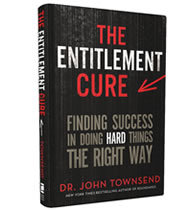Henry Cloud's Blog, page 19
February 11, 2016
When Your Teen Pulls Away
 Some parents fear that if they set boundaries with teens, it will cause their son or daughter to detach themselves and withdraw their love from them. This fear can cause these parents to avoid boundaries at all costs, and to do their best to keep their kid connected. When this happens, it teaches teens that they can get their way and avoid limits by cutting off the love supply. These adolescents often have difficulty experiencing healthy adult relationships, because they have learned to withdraw love, as a form of emotional blackmail, until the other person caves in. You don’t want this relational future for your teen.
Some parents fear that if they set boundaries with teens, it will cause their son or daughter to detach themselves and withdraw their love from them. This fear can cause these parents to avoid boundaries at all costs, and to do their best to keep their kid connected. When this happens, it teaches teens that they can get their way and avoid limits by cutting off the love supply. These adolescents often have difficulty experiencing healthy adult relationships, because they have learned to withdraw love, as a form of emotional blackmail, until the other person caves in. You don’t want this relational future for your teen.
If you are vulnerable to fear, you may have some sort of dependency on your teen’s goodwill and feelings toward you. You may be trying to get your teen to meet your need for love and connection. If so, you are in jeopardy of not doing right by your child.
To resolve your fear of withdrawal of love, connect with other adults who will support, affirm, and encourage you. Such adults can meet your relational needs. Use their good feelings to fill the vacuum so that when your teen withdraws because of some limits you have imposed, you can tolerate the withdrawal.
When your teen withdraws, take the initiative to go after him and try to reconnect. Teens sometimes don’t have the skills to pull themselves back into relationship, so they need their parents to help them. But while you are inviting your teen back into connection with you, keep your requirements and expectations intact. Your teen still needs them.
Remember that teens need a certain amount of time and space to pull away from parents — not totally away, but enough to form their own opinions, identity, and values. When you experience this withdrawal, realize it’s a normal part of your teen’s developmental passage. Don’t personalize it. Instead, help your teen know that it’s a good thing for him and that you’ll be there when he or she wants to reconnect.
________
 Learn more ways to help your teen grow into a mature, responsible adult by reading Boundaries with Teens.
Learn more ways to help your teen grow into a mature, responsible adult by reading Boundaries with Teens.
Learn more about setting boundaries with teens from these Focus on the Family broadcasts featuring Dr. John Townsend:
Boundaries with Teens: Part 1 of 2
Boundaries with Teens: Part 2 of 2
The post When Your Teen Pulls Away appeared first on Boundaries Books.
February 4, 2016
Four Reasons Why You Need to Respect the Future
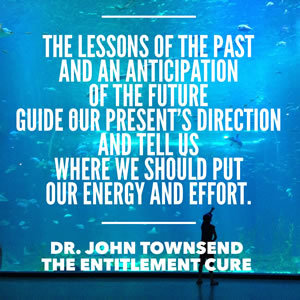 No one would argue with the importance of living in the present. God designed creation so that we live and breathe in the present. When we lose current experience, we are only half alive. But here is the problem, and it’s a huge one: Focusing only on the present is just as dysfunctional as focusing only on the future.
No one would argue with the importance of living in the present. God designed creation so that we live and breathe in the present. When we lose current experience, we are only half alive. But here is the problem, and it’s a huge one: Focusing only on the present is just as dysfunctional as focusing only on the future.
The entitlement mantra about the future is: Ignore the future and focus on today. But the Hard Way mantra is: Respect the future and let it guide today’s experience. And why should we respect the future? Here are four reasons:
One Day You Will Experience Your Future
Your future is not “out there.” Very soon, it won’t be called the future; it will be called Now. And you’ll experience it, feel it, touch it, and taste it, for better or worse.
The future certainly will arrive — and as much as possible, we want to think about the things that we will experience before they overtake us.
Think of it this way. Small children don’t have the skills to truly understand the impact of the future. Their neurology and emotions are all about today and now. One of the roles of a good parent is to get children to consider the future. “If you bonk your little brother on the head, you’ll be sitting in a time-out chair in the kitchen.” The pleasure of dominating a sibling feels less inviting when a future of no freedom seems likely. This is why parents need to follow up on their promises about consequences for certain behavior. If your promises amount to empty threats, maybe because you feel tired, your child will learn that the future is not to be respected. All I have to do, he thinks, is get used to a nagging parent. But a competent parent imposes the consequence consistently so that the child actually experiences the future consequence as a present-day reality, and therefore respects it.
Adults too need to respect the future. We aren’t bulletproof, any more than children are. In business, CEOs sign contracts in the present and need to honor them in the future even if circumstances change. If you are a young adult, your toned body will become more difficult to maintain as you age. As Rick Warren says, “I used to have a six pack, but then it turned into a keg.”
Bill Hybels says that “we tend not to drift into better behaviors.” He means that over time, our energy, our bodies, and our focus lose steam. That’s just the nature of things. If you are over the age of thirty-five, look in the mirror after you shower. This truth will be evident. Because we do not tend to drift into better behaviors, we must constantly put resources northward to help combat this southward erosion of life. The older you get, the more time and effort you must devote to moving against the flow. Tomorrow is coming like a train, and you will experience either what it is like to jump on board and have a great ride or what it feels like to be left standing on the tracks with nowhere to go.
A Groundhog Day Life Doesn’t Work
Let’s look a little deeper into your present, the life you live today. You may be struggling with major difficulties. Or you may be in the okay range, where things aren’t ideal but they’re good enough. Or you may be enjoying a fantastic life.
No one wants a life of major struggle to continue forever. That would feel miserable and hopeless. And few people are content with just “okay” forever. That’s just a halfway satisfying life; sooner or later, those with such a life wake up and think, I settled. And I paid a big price for it.
I don’t even know anyone with a fantastic life who wants everything to stay the way it is forever. Even people with a great life still want growth, improvement, and change. And the most self-satisfied and complacent among us — such as the Pharisee in one of Jesus’ parables, the man who said, “God, I thank you that I am not like other people” (Luke 18:11) — aren’t seen in a positive light.
A life that does not change and improve is like the movie Groundhog Day, in which Bill Murray’s character repeats his life over and over again until he becomes completely miserable. Even his successes become meaningless.
And that’s why you must respect, consider, and act on your future. Because if you don’t, your best possible case is Groundhog Day, where you, your relationships, your career, and your life stay stuck in a repetitive pattern. Same thoughts, habits, patterns, struggles, and activities. When you don’t think in the present about the future, you get trapped in an endless loop.
My kids have friends who didn’t leave for college after high school, though they could have. Nor did they find something meaningful to do in town. The result is that they have become objects of pity to their friends. Often they continue to hang out with much younger high school kids, reliving their “glory days,” because that’s where they got stuck emotionally.
Some of my own friends live in Groundhog Day. They don’t spend energy on the future, such as where they will vacation next year or where they hope their kids will go to college. I find it hard to spend a great deal of time with them, because I see so much potential for them to develop their talents, find more passion, take risks, and experience transformational lives. Instead, I feel sadness, discouragement, and frustration for them.
Some of these friends have escaped the loop by starting to hang around people who draw their attention to the importance of their future (perhaps men and women in a great church or from a small group or a movement). And some have broken out of that wasteful pattern because they encountered great loss, such as a child on drugs or a divorce. But too many of them continue to play Bill Murray.
While Your Past Is a Closed Door, Your Future Is an Open One
Respect the future because it is not over and done, as is your past. It is yet to be decided, and there are so many possibilities. On the one hand, you can’t undo the past. You can’t change your mistakes, wins, and losses. That door is closed. On the other hand, you can learn from your past, and it can be redeemed in your growth and healing. But there is no “do over.”
Not so with the future.
I’m a big believer in blue-sky thinking. With my business clients, I do a lot of “let’s start with the ideal” brainstorming about the company, its potential, and what might be possible. I’ll set up a whiteboard and say, “It’s a blank slate; fill in your future.” Inevitably, creative, innovative, exciting ideas fill up the space. We are built to think about and get energy from the hope that comes from a bright future.
When this catalytic energy occurs, regardless of whether we’re talking about your company or your personal life, it’s bound to change your present behavior. You will be more strategic about how you spend your time, money, and energy. You will be more disciplined in how you choose your relationships. You will be driven and fueled by a hope for a much better future. When you respect the future, you dramatically increase your chances of attaining a better one.
The Magic of Compounding Today Creates a Great Future
Financial managers use the term “the magic of compounding” to describe a great benefit that accrues when you respect the future. When people save and invest well early in life, the money saved and earned increases at a high rate over time. When people begin to save later in life, they can’t take as much advantage of the magic of compounding. Time is on your side when you save from an early age.
The magic of compounding is one variety of the concept of sowing and reaping. The better and earlier you invest your time, talents, and treasures, the better the rest of your life will be. Healthy marriages, families, careers, spiritual lives, and bodies are all the result of reaping from earlier “sowing.” Early is always better.
A friend of mine who reviewed the manuscript for my book The Entitlement Cure told me about a client of hers whose motto was “one day at a time.” This client wanted to be free of anxiety and dread over the future and wanted to keep her life simple. So she never saved, never watched her diet, and didn’t study up on how to create and maintain great relationships. She literally lived one day at a time. Now in her later years, she is having great difficulty. Retirement will be a problem for her. She has diabetes from her poor eating habits and chaotic lifestyle. And she enjoys no stable relationships.
“One day at a time” is actually a helpful statement when used in context. I use it when I work with people in Alcoholics Anonymous who feel overwhelmed by their many life struggles. But you must balance “one day at a time” with being respectful of the future and guiding your daily decisions by how they will impact you tomorrow.
When we pay attention to all three time periods (past, present, and future), life goes well for us. The lessons of the past and an anticipation of the future guide our present’s direction and tell us where we should put our energy and effort.
________
Adapted from The Entitlement Cure by Dr. John Townsend. Learn more about this ground-breaking book at EntitlementCure.com.
The post Four Reasons Why You Need to Respect the Future appeared first on Boundaries Books.
January 26, 2016
Why Leaders Need to Set Boundaries in the Workplace
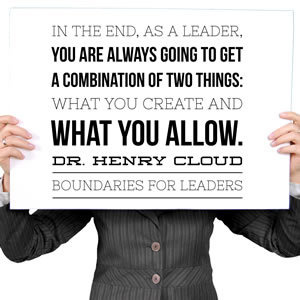 What do boundaries for leaders look like at work? They are made up of two essential things: what you create and what you allow. A “boundary” is a property line. It defines where your property begins and ends. If you think about your home, on your property, you can define what is going to happen there, and what is not.
What do boundaries for leaders look like at work? They are made up of two essential things: what you create and what you allow. A “boundary” is a property line. It defines where your property begins and ends. If you think about your home, on your property, you can define what is going to happen there, and what is not.
As a leader in the workplace, you are in charge of the vision, the people you invite in, what the goals and purposes are going to be, what behavior is going to be allowed and what isn’t. Leaders build and allow the culture. You set the agenda, and you make the rules. And what you find there, you own. It is your creation or your allowances that have made it be. Simply stated, the leaders’ boundaries define and shape what is going to be and what isn’t. In the end, as a leader, you are always going to get a combination of two things: what you create and what you allow.
I (Dr. Cloud) was leading an offsite for a health care company recently about a range of leadership issues, and the director of HR asked a key question. “So, how can you know if the problem is about the leader, or the follower?”
He went on to talk about “problem employees,” who don’t perform or who are difficult. “There is such a thing as a ‘follower’ who isn’t getting it, right?” he said.
“Sure,” I said. “But on whose watch? In whose culture? Who built the team that allows that? Who is over that employee that is a ‘problem’? And who is over the employee that allows employees like that to be that way? And if that employee is confused about the strategy or direction, who is it that sets that strategy and direction for their team or the organization? In the language of Apple, ‘who is the DRI , the directly responsible individual?’” Who owns it?
It is a central principle of boundaries: ownership. Ultimately, leaders own it. They are the ones who define and create the boundaries that drive the behavior that forms the identity of teams and culture and sets the standards of performance. Leaders define the direction and are responsible for making it happen. And they are responsible for the accountability systems that ensure that it does happen. It always comes back to leadership and the boundaries they allow to exist on their property. Leaders define the boundaries, and successful leaders define them well in several key areas:
The vision, the focus, the attention, and the activities that create forward movement are defined by leaders.
The emotional climate of the organization and its culture is created and sustained by leaders.
The unity and connectedness of the organization and the teams are built or fragmented by leaders.
The thinking and beliefs of the organization are sown and grown by leaders.
The amount and kinds of control and empowerment that people have are given and required by leaders.
The performance and development of their teams and direct reports are stewarded by leaders.
The leadership of oneself, which entails establishing one’s own boundaries and stewardship of the organization, is required by leaders.
By applying essential boundaries for leaders, you make sure certain things happen, prevent other things from happening, and keep it all moving forward. Leaders are a positive force for good and a negative force against bad. You know what they are for and what they are against.
________
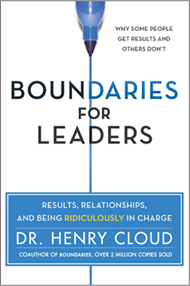 Why does a company flourish under one leader while it declines under another capable individual? Why do some teams outperform other teams within the same company? Find out in Dr. Henry Cloud’s transforming book, Boundaries for Leaders.
Why does a company flourish under one leader while it declines under another capable individual? Why do some teams outperform other teams within the same company? Find out in Dr. Henry Cloud’s transforming book, Boundaries for Leaders.
The post Why Leaders Need to Set Boundaries in the Workplace appeared first on Boundaries Books.
January 19, 2016
How to Discern Hurt from Harm in a Relationship
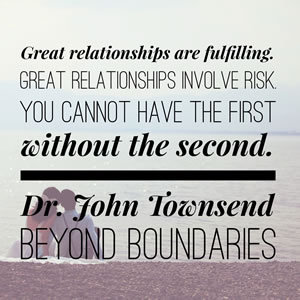 Great relationships are fulfilling.
Great relationships are fulfilling.
Great relationships involve risk.
You can’t have the first without the second.
Great relationships require that you be open to taking risks—risks of being misunderstood, of alienation, of someone being hurt by you as well. It doesn’t mean relationships aren’t worth the risks, for the good ones are. It is simply the price of the course. No pain, no gain.
The challenge is that people who have been burnt in a relationship often have trouble with risk. They get out of balance. Sometimes they insist on no risk and try to control the course of the relationship. This can actually be boring and unfulfilling. And sometimes they allow behavior that is unacceptable in the name of taking risks. In other words, they don’t quite know the difference between risks that are worth taking and risks that are not worth taking. In order to move beyond boundaries and prepare yourself for openness and vulnerability, you have to clarify which risks are—and are not—worth taking.
For example, Nick was a man who came from a harsh and controlling family. He had few choices as a boy and had adopted a compliant personality style to survive his childhood. He just toed the line to make it from day to day and never expressed his real thoughts and feelings. His compliance pattern worked for him, and he learned to channel his energies into being a business success. He worked great in authoritarian structures, where the boss was strict and rigid. But he felt dead inside, and he knew it was a problem.
As I (Dr. Townsend) worked with Nick, he became aware of how much legitimate personal power and control he had never had. As often happens, when he got in touch with those feelings, he went through a season of becoming controlling himself, sort of turning the tables. Actually, it was a way for him to separate himself enough from the controlling dad in his mind, to become more comfortable with his own power. But during this season, he was hard to live with. When his wife disagreed with him about a financial decision he made, for example, this normally easygoing guy said, “If you loved me, you would support and trust me.” In other words, he interpreted her freedom as a lack of love and as something that was not good for him.
But here is the reality: the problem is never the freedom. The problem is always the character of two people: yours and the person you love. Don’t make freedom the bad guy; instead, you must celebrate and protect it, because without it there is no love. But you get hurt either because the person was unloving, there was a miscommunication, or you allowed something you shouldn’t have, or because you wanted something that wasn’t possible. So that leads us to the question of risk. If risk is inevitable and even a good thing, you need to understand the difference between risks that are acceptable and those that are not.
How do you discern the difference between a hurtful result and a harmful result when you take a risk? Here’s the distinction: while hurt is the experience of something painful, it may not be damaging. But harm is different. Harm creates significant problems in the three primary areas of life:
1. Withdrawal from other relationships
If your experience in a relationship affects how you relate to other people in a significantly negative way, this is a sign of harm. For example, if you find yourself unable to reach out and let others in, isolate yourself from people, or withdraw from support, that is harm. The difficult relationship caused damage that impacts your other relationships, and you need time and attention to heal.
2. Personal decline
Your personal life encompasses everything that happens inside your skin: your behaviors, how you feel about yourself, your emotional well-being, and your habits. If the relational conflict results in any kind of sustained personal decline — for example, depression, significant weight change, or incapacitating self-doubt—that is harm.
3. Diminished performance
Performance has to do with the doing aspects of life, the tasks and activities. Your job, career, financial life, home organization, and time management are parts of the performance piece. Harm happens when you can no longer function at the same levels you did or find that you can start projects and tasks but can’t finish them. Often, a person will experience problems in energy, focus, creativity, or enjoyment of work.
Are you starting to see the difference between hurt and harm more clearly? Does it give you a better idea of the kinds of risks that routinely come with connection and the kinds of risks that should never be taken? Here are some additional examples to help make the difference crystal clear:
It is acceptable to have an argument, but not to be yelled at and treated with contempt.
It is acceptable to pick the wrong person, but not to let that person take over your life, thoughts, and values.
It is acceptable to open up to a person and feel bad if they become critical of you, but not to allow it to happen repeatedly.
It is acceptable to give up controlling the outcome of the relationship and where it will end up, but not to let the other person’s choices be the only choices.
When problems happen in a relationship, keep pushing through hurt, as long as you are committed to the relationship. But pay attention to when things cross the line into harm.
________
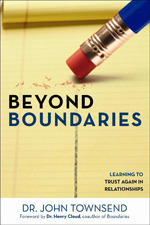 Beyond Boundaries by Dr. John Townsend is the must-read guide designed to help you reinstate appropriate closeness with someone who broke your trust, discern when true change has occurred, and restore former relationships to a healthy dynamic. Learn More
Beyond Boundaries by Dr. John Townsend is the must-read guide designed to help you reinstate appropriate closeness with someone who broke your trust, discern when true change has occurred, and restore former relationships to a healthy dynamic. Learn More
Image courtesy of jscreationzs at FreeDigitalPhotos.net
The post How to Discern Hurt from Harm in a Relationship appeared first on Boundaries Books.
January 7, 2016
Praise and Reward Problems that Lead to Entitlement
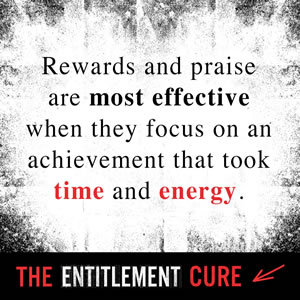 We sometimes reward (through actions) and praise (through words) our spouses, employees, children, and friends in ways that can actually harm them, even though it feels good at the time because it seems so positive. But what seems positive is not always what is best. A pizza slice or two is positive — but four can cause problems. These unwise reward/praise approaches, although well intentioned, create bad fruit. Remember — these are patterns, not isolated events. Doing these things every now and then would be all right, but when they become trends, they risk fostering attitudes of entitlement.
We sometimes reward (through actions) and praise (through words) our spouses, employees, children, and friends in ways that can actually harm them, even though it feels good at the time because it seems so positive. But what seems positive is not always what is best. A pizza slice or two is positive — but four can cause problems. These unwise reward/praise approaches, although well intentioned, create bad fruit. Remember — these are patterns, not isolated events. Doing these things every now and then would be all right, but when they become trends, they risk fostering attitudes of entitlement.
Praising What Takes No Effort
Rewards and praise are most effective when they focus on an achievement that took time and energy. Most of the time, when praise is at its most effective, that achievement would involve a person’s character or internal makeup. To repeatedly praise a little girl for being pretty puts her in a bind. What she hears is, What gets me loved is something I can’t do much about. She also hears, My inside isn’t important, just my outside.
We all know people, especially women, who have received that sort of treatment. What happens to many of them as their bodies age over time? They become desperate to look young again, since that is the only thing that has brought them love and acceptance. How would that little girl feel if instead she heard, “You work really hard and you do a good job at school.” Now what receives the praise? Her diligence, which she can do a lot about. Although her looks will fade over time, her character will not. Her character will grow and blossom and become even more beautiful her entire life.
Praising What Is Required
Praise should be reserved for those times when someone stretches himself beyond the norm, puts extra effort or time into a task, or exceeds expectations. It’s not about doing the minimum, the expected. No one gets a party for showing up to work on time: “So you also, when you have done everything you were told to do, should say, ‘We are unworthy servants; we have only done our duty’” (Luke 17:10).
A client of mine owned a media business. But before he went into business for himself, he’d had a harsh and uncaring boss. This boss had alienated people and ultimately ruined his company, after the rock stars and the high performers on whom he depended all left because they simply wouldn’t put up with his behavior anymore.
So my client, having seen the trouble that went with a lack of praise and reward, overcompensated. He went too far in his attempt to avoid being the kind of boss who had so wounded him. He overpaid his staff. He didn’t hold them to high standards in their work. He didn’t correct them or change their compensation when they underperformed.
His actions created a happy staff. Who wouldn’t like such an arrangement? And he truly was a nice, caring boss. But his employees didn’t pull together as a team, nor did they perform well. When I saw all this, I helped him restructure his expectations, alter the company comp package, and change the corporate culture to insist on both high performance and high relationships.
Things were rocky for a while. Staff members now considered him unfair — after all, they had known only an entitlement-producing boss. A couple of them left. But most of the staff understood that if the company was to survive, a new culture had to be put in place, one that expected performance. Those who stayed buckled down and started showing good attitudes. Because of these changes, the business started flourishing. Don’t get caught in the “praise for the minimum” trap!
Praising What Is Not Specific
“You are amazing!”
“You are just awesome!”
“You’re a great human being just because you are you.”
Well, thanks for that vague compliment. But where do I go with it? Our culture is awash in these exaggerations that have roughly the same value as an empty calorie. Both yield insignificant benefits. Our brains have buckets where information goes. Praise should go in the right bucket: the bucket of hard work, of being kind, of being honest, of being vulnerable. But the brain has no appropriate bucket for such nonspecific, excessive statements, and therefore is unable to make constructive use of them.
I once praised in this way, until I realized that I did so only because it was a shortcut. It takes little effort to speak such phrases, and I could say them to my wife or a fence post, it didn’t really matter. What requires effort is to take the time to observe and relate to a specific person about a particular praiseworthy behavior or attitude: “The homemade soup you took all day to make is amazing.” “You are awesome in how you motivate our staff to make more phone calls every day.” These statements go into the buckets that count.
Praising What Takes an Ability and Creates an Identity
We need affirmation when we try hard and achieve well. We also need to know when we have done well in our class, our staff, or our sport. That is why competition can be healthy. The message is, “You are good at what you do.” But when the message crosses the line to, “You are a better person than others because of what you do,” or “You deserve special treatment,” trouble results.
If you are a parent, the right message is, “Great job on defense in the soccer game! You worked hard with your team and your individual plays were excellent. Now go and help the coach pick up the equipment.” Top-tier executives, students, managers, and athletes all have to stand in line. Keep in mind that while your child may be better in ability, she is no better intrinsically. In the eyes of God, she is no better than anyone else, as the Lord is no respecter of persons (see Acts 10:34).
Praising What Is Not Based on Reality
One of the saddest things I see an encouraging person do is to give someone hope even though no basis exists for that hope. Buoyed by an encourager who said, “You can do anything you want to,” an individual might spend years and all of his energy in traveling down a path that is simply the wrong path for him and that inevitably leads to disappointment.
Do you enjoy the current crop of talent-based TV shows? I do; I love both the talent and the energy. But a pastor at a church I recently attended pointed out that early in each season, you see a lot of train wrecks when individuals work their hearts out trying to sing, dance, or entertain when clearly they lack the skill or talent. “Why,” he asked, “didn’t anyone love them enough, early on, to say, ‘That’s not you; let me help you discover what you’re really good at’?”
My parents never told me I could play in the NBA if I wanted to, because they knew that while I liked basketball, I didn’t have a lot of talent. I am grateful that my parents helped me put my energies into areas where I had more strengths.
A Lack of Warmth
Ironically, entitlement can occur when a person gets little praise, care, or warmth. That might surprise you, but it makes sense.
We all need to know we are loved and accepted. It’s a basic human requirement for health and functioning. But when a person has a number of cold, detached, or self-absorbed relationships, he often creates what is called a defensive grandiose identity. That is, to protect himself from the emptiness or harshness of his relational sphere, he will craft a self-perception that is entitled, self-centered, and larger than life. That helps keep the hurt and loneliness at bay.
A business client of mine was seriously alienating himself from his staff and family. He couldn’t take criticism well, had to feel (and let people know) that he had all the answers, and presented himself as smarter and better than everyone around him. He had put himself in danger of losing both his company and his family.
He and I began digging into who he was as a person. I didn’t find in his background a family that spoiled him or praised him in the wrong way. Instead, I discovered that his home life as a child had included two damaged parents who had little interest in reaching into their bright son’s internal world, understanding him, and caring for him. They functioned well in terms of providing structure and values. But because they did not offer him warmth, at his core he felt unlovable and ashamed of himself.
As we dug further, he remembered that when he went away to college, he reinvented himself. He tried out for sports, met girls, and got elected to student government. But his attitude went the wrong way. Instead of becoming grateful and caring, he came across as arrogant and superior.
This story has a happy ending. He had enough self-awareness and had felt enough pain that he was motivated to deal with the early hurts of his cold childhood and then do some productive grieving, letting go, and asking for support to replace what he had lost. Almost immediately, he saw his family and company with new eyes. He cared more for them, listened well, and willingly entered their worlds.
Defensive grandiosity is simply a shell we construct to keep negative feelings at bay. When the entitled person begins the process of growth, the shell begins to dissolve, and healthy feelings and behavior begin to form.
______
Taken from The Entitlement Cure by Dr. John Townsend. Visit TheEntitlementCure.com now to learn more and order your copy.
Recently Dr. Townsend wrote an editorial on foxnews.com about the Ethan Crouch situation and how to prevent an “Affluenza” parenting tragedy in your own family. Read It Here
Watch Dr. Townsend’s interview on Fox & Friends as he discusses how not to raise an “Affluenza” teen:
Watch the latest video at video.foxnews.com
The post Praise and Reward Problems that Lead to Entitlement appeared first on Boundaries Books.
January 6, 2016
God, the Bible, and Boundaries
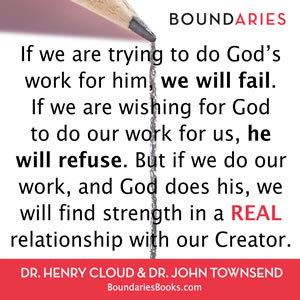 When some people read the Bible, they see a book of rules, do’s and don’ts. When others read it, they see a philosophy of life, principles for the wise. Still others see mythology, stories about the nature of human existence and the human dilemma.
When some people read the Bible, they see a book of rules, do’s and don’ts. When others read it, they see a philosophy of life, principles for the wise. Still others see mythology, stories about the nature of human existence and the human dilemma.
Certainly, the Bible contains rules, principles, and stories that explain what it is like to exist on this earth. But to us, the Bible is a living book about relationship. Relationship of God to people, people to God, and people to each other. It is about a God who created this world, placed people in it, related to people, lost that relationship, and continues to heal that relationship. It is about God as creator: this is his creation. It is about God as ruler: he ultimately controls his world and will govern it. And it is about God as redeemer: he finds, saves, and heals his loved ones who are lost and in bondage.
When a lawyer asked Jesus which was the greatest commandment in the Law, Jesus said to him, “‘Love the Lord your God with all your heart and with all your soul and with all your mind.’ This is the first and greatest commandment. And the second is like it: ‘Love your neighbor as yourself.’ All the Law and the Prophets hang on these two commandments” (Matt. 22:37 – 40). The entire Scripture communicates a message of love. “Love God, and love your neighbor as yourself.”
But how do we do that? Well, that’s why there are so many other passages! Loving God and our neighbor is difficult. One of the main reasons it’s so difficult is because of boundary problems, which are essentially problems of responsibility. We do not know who is responsible for what, where we end and someone else begins, where God ends and we begin. The Bible clarifies those boundaries so that we can begin to see who should do what in this labor of love.
Respecting Boundaries
We have personal boundaries, personal property lines, in our relationship with God. God has designed the world so that boundaries are to be respected. He respects ours, and we need to respect his.
God respects our boundaries in many ways. First, he leaves work for us to do that only we can do. And he allows us to experience the painful consequences of our behavior so that we will change. He is not willing for any of us to perish and takes no pleasure in our destruction (2 Peter 3:9; Ezek. 18:23), but he wants us to change for our own good and his glory. It hurts him deeply when we don’t. But at the same time, he does not rescue us; he wants us to work it out for our own good. He will not violate our wish to be left alone, although he will plead with us to come back to him.
Second, he respects our no. He tries neither to control nor nag us. He allows us to say no and go our way. Think of the parable of the prodigal son, the story of the rich young ruler, or the story of Joshua and his people. In all of these examples, God gives a choice and allows the people involved to make up their minds. When people say no, he allows it and keeps on loving them. He is a giver. And one of the things he always gives is a choice, but like a real giver, he also gives the consequences of those choices. He respects boundaries.
Respecting His Boundaries
God expects his boundaries to be respected as well. When he makes choices, or says no to us, that is his right, his freedom. If we are to have a real relationship with him, we need to respect that freedom. When we try and put him into binds where he “has to do something,” we are testing his freedom. When we are angry with him for what he does not do, we are not allowing him the freedom to be who he is.
The basic problem in human relationship is that of freedom. We call people bad because they do not do what we want them to do. We judge them for being themselves, for fulfilling their wishes. We withdraw love from them when they do what they feel is best for them, but it is not what we want them to do.
We do the same thing with God. We feel entitled to God’s favor, as if he has to do what we want him to. How do you feel when someone asks you for a favor but does not give you a free choice? This childish entitlement gets many people dissatisfied with God the same way that they are dissatisfied with others in their lives. They hate the freedom of others.
God is free from us. When he does something for us, he does it out of choice. He is not “under compulsion” or guilt or manipulation. He does things, like dying for us, because he wants to. We can rest in his pure love; he has no hidden resentment in what he does. His freedom allows him to love.
In the same way that we want others to respect our no, God wants us to respect his. He does not want us to make him the bad guy when he makes a choice. We do not like others trying to manipulate or control us with guilt, and neither does he.
A Real Relationship
Then again, God does not want us to be passive in our relationship with him either. Sometimes, through dialogue, he changes his mind. We can influence him because ours is a real relationship of the kind Abraham had with God (Gen. 18:16 – 33). God said that he would destroy Sodom, yet Abraham talked him out of it if he could find ten righteous people.
When we make our feelings and wishes known, God responds. We do not often think of God this way, but the Bible is clear. It is as though God says, “If it really means that much to you, it’s okay with me.” One of the most astounding teachings of the Bible is that we can influence God. It wouldn’t be a real relationship if we couldn’t. “ ‘Come now, let us reason together,’ says the LORD” (Isa. 1:18). Like a real friend, or a real father, he says, “Let me hear your side of things and I will consider them. They matter to me. Maybe you can convince me to change my mind.”
God wants us to respect his boundaries; he doesn’t want us to withdraw our love when he says no. But he has nothing at all against our trying to persuade him to change his mind. In fact, he asks for us to be tenacious. Often he says, “Wait,” seeing how much we really want something. Other times, it seems he changes his mind as a result of our relationship with him. Either way, we respect his wishes and stay in relationship.
Boundaries are inherent in any relationship God has created, for they define the two parties who are loving each other. In this sense, boundaries between us and God are very important. They are not to do away with the fundamental oneness or unity that we have with him (John 17:20 – 23), but they are to define the two parties in unity. There is no unity without distinct identities, and boundaries define the distinct identities involved.
We need to know these boundaries between us and him. Boundaries help us to be the best we can be — in God’s image. They let us see God as he really is. They enable us to negotiate life, fulfilling our responsibilities and requirements. If we are trying to do his work for him, we will fail. If we are wishing for him to do our work for us, he will refuse. But if we do our work, and God does his, we will find strength in a real relationship with our Creator.
________
From Boundaries by Dr. Henry Cloud and Dr. John Townsend.
The post God, the Bible, and Boundaries appeared first on Boundaries Books.
December 15, 2015
You Can’t Always Get What You Want, but You’d Better Try
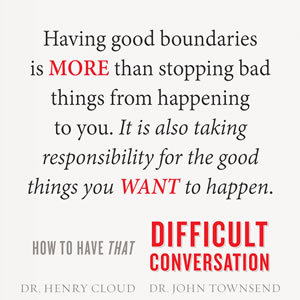 Telling other people what you want is key to feeling alive in a relationship and keeping things vibrant for both people. If only one person is getting his or her desires met, the relationship suffers. Unfortunately, many people do not get what they want in a relationship. But, they could if they knew how to communicate their desires.
Telling other people what you want is key to feeling alive in a relationship and keeping things vibrant for both people. If only one person is getting his or her desires met, the relationship suffers. Unfortunately, many people do not get what they want in a relationship. But, they could if they knew how to communicate their desires.
For example, Peter began dating Marla. At first, he was in absolute heaven. She was so “easy to get along with,” he said. About five months later, though, something happened. “I broke up with Marla,” he said. “It just wasn’t working out.”
”What happened?” I (Dr. Cloud) asked.
“In the beginning, she was like a breath of fresh air,” Peter replied. But as time went on, I noticed a couple of things. First, I could never figure out what she wanted. I would ask her what she wanted to do, or where she wanted to go, or how she felt about something, and she would always defer to me. Even though that felt good in the beginning, over time, I got bored with Marla’s flexibility. There was something missing. I don’t know exactly what it was.
Second, she wouldn’t really pout, but she would be sad, or quiet, or something. I would feel like I had done something wrong, but I didn’t know what it was. So I would ask. At first, she would say, ‘Nothing,’ but I knew that was bull. So I would have to pull it out of her, and then I would find out that she had wanted me to do something I hadn’t done, or that she was bugged about something she hadn’t told me about. I felt like I was letting her down, but I couldn’t read her mind. I was frustrated not knowing when things were okay and when they weren’t. I think I need someone more up front with what they are thinking and what they want.”
Many people think of “boundaries” only as setting limits, saying no, or trying to stop something destructive from happening. But having good boundaries is more than stopping bad things from happening to you. It is also taking responsibility for the good things you want to happen.
When you take responsibility for your desires and communicate them well, a relationship has much more chemistry, connection, and mutual fulfillment. You know about and negotiate any issues; there is give and take. And no one is walking around resentful and depressed.
Think about Peter and Marla for a moment. She had desires she wanted fulfilled in her relationship with Peter. But she thought Peter was responsible for knowing what her desires were and for taking the first step toward fulfilling them. She shifted the responsibility for what she wanted from her to him; she thought her “wants” were his problem, not hers. When he did not solve her problem, when she felt sad or resentful, she saw it as Peter’s responsibility to figure out what she was feeling and do something about it. Ultimately, this proved too much for him to do.
To have a relationship that works well, we should communicate our wants not outwardly, but inwardly. We should have a “responsibility” talk with ourselves before we have a “talk” with another person. Here are some of the things we will need to do:
Own our “want”—be honest about what we want and be aware that our desire is our responsibility.
Own the feelings that occur when our desire is not getting met—if we are sad, we needs to tell other people, not wait for them to figure it out.
Choose to communicate and move toward other people to let our wants be known.
Communicate desire, not demand.
We always have to look at ourselves first to make sure we are doing our part correctly. This is particularly true with wants and desires; others do not magically know what we want, and they need to be told in ways they can accept. So the first conversation has to take place inside.
Freedom is essential to a good relationship. If we’re not free, we can’t love. If people feel as though they can’t say “no” to us and if they do things for us out of compulsion, guilt, or feelings of obligation, they will resent doing those things. If we ask for things we want in ways that make someone feel as though “no” is not okay with us, the relationship turns into a control battle. Freedom and love suffer, and even fulfilled desires can’t fully satisfy because they are not given in love.
________
Adapted from How to Have That Difficult Conversation by Dr. Henry Cloud and Dr. John Townsend
The post You Can’t Always Get What You Want, but You’d Better Try appeared first on Boundaries Books.
December 7, 2015
Give Yourself Permission to Fail … and Learn
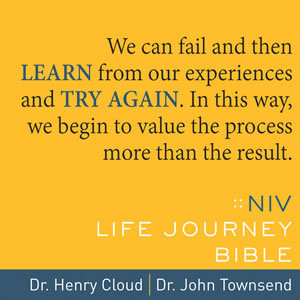 If there was anyone in Biblical history who learned from his failures, it was Peter. Consider this man who failed in his effort to walk on water (see Matthew 14:28 – 30), denied Jesus (see Luke 22:54–62) and suffered a rebuke from Paul regarding his treatment of Gentile Christians (see Galatians 2:11 – 13). Peter was outspoken, hotheaded and sometimes cowardly, but he became a founder of the church and an influential figure in church history.
If there was anyone in Biblical history who learned from his failures, it was Peter. Consider this man who failed in his effort to walk on water (see Matthew 14:28 – 30), denied Jesus (see Luke 22:54–62) and suffered a rebuke from Paul regarding his treatment of Gentile Christians (see Galatians 2:11 – 13). Peter was outspoken, hotheaded and sometimes cowardly, but he became a founder of the church and an influential figure in church history.
Like leaders of yesterday and today, we make mistakes. Whatever skills and talents we possess need to be refined. We can’t learn to be an authority and have expertise in an area if we don’t have the freedom to practice and learn. We need to give ourselves permission to fail. And that comes in part from doing what 2 Peter 3:18 says, “Grow in the grace and knowledge of our Lord and Savior Jesus Christ. To him be glory both now and forever!” Jesus will shepherd us through all of our failures.
No one ever became an expert in any area without trial and error. Whether it’s cooking, basketball, business, personal finance, teaching, Bible exegesis or child rearing, developing a skill requires practice. Practicing is an important aspect of realizing independence and adulthood.
We can fail and then learn from our experiences and try again. In this way, we begin to value the process more than the result. We see that growth is a journey that we are taking, walking hand in hand with God. When we fall down, as Peter did, we take God’s hand and get back up. If we keep doing that, like Peter, we will grow.
________
Find more insightful commentary from Drs. Henry Cloud and John Townsend, pick up the NIV Life Journey Bible, which combines the world’s most accessible Bible translation with exclusive boundaries teaching.
The post Give Yourself Permission to Fail … and Learn appeared first on Boundaries Books.
December 2, 2015
Am I Being Selfish When I Set Boundaries?
 “Now, wait a minute,” Teresa said, shaking her head. “How can I set limits on those who need me? Isn’t that living for me and not for God?”
“Now, wait a minute,” Teresa said, shaking her head. “How can I set limits on those who need me? Isn’t that living for me and not for God?”
Teresa was voicing one of the main objections to boundary setting for Christians: a deep-seated fear of being self-centered, interested only in one’s own concerns and not those of others.
It is absolutely true that we are to be a loving people. Concerned for the welfare of others. In fact, the number-one hallmark of Christians is that we love others (John 13:35).
So don’t boundaries turn us from other-centeredness to self-centeredness? The answer is no. Appropriate boundaries actually increase our ability to care about others. People with highly developed limits are the most caring people on earth. How can this be true?
First, let’s make a distinction between selfishness and stewardship. Selfishness has to do with a fixation on our own wishes and desires, to the exclusion of our responsibility to love others. Though having wishes and desires is a God-given trait (Proverbs 13:4), we are to keep them in line with healthy goals and responsibility.
For one thing, we may not want what we need. Mr. Insensitive may desperately need help with the fact that he’s a terrible listener. But he may not want it. God is much more interested in meeting our needs than he is granting all our wishes. For example, he denied Paul’s wish to heal his “thorn in the flesh” (2 Corinthians 12:7–10). At the same time, he met Paul’s needs to the point that Paul felt content and full:
I know what it is to be in need, and I know what it is to have plenty. I have learned the secret of being content in any and every situation, whether well fed or hungry, whether living in plenty or in want. I can do everything through him who gives me strength. (Philippians 4:12–13)
It helps the Christian afraid of setting boundaries to know that God meets our needs. “God will meet all your needs according to his glorious riches in Christ Jesus” (Philippians 4:19). At the same time, God does not make our wishes and desires “all bad” either. He will meet many of them.
Our Needs Are Our Responsibility
Even with God’s help, however, it is crucial to understand that meeting our own needs is basically our job. We can’t wait passively for others to take care of us. Jesus told us to “Ask … seek … knock” (Matthew 7:7). We are to “work out [our] salvation with fear and trembling” (Philippians 2:12). Even knowing that “it is God who works in [us]” (Philippians 2:13), we are our own responsibility.
This is a very different picture than many of us are used to. Some individuals see their needs as bad, selfish, and at best, a luxury. Others see them as something that God or others should do for them. But the biblical picture is clear: our lives are our responsibility.
At the end of our lives this truth becomes crystal clear. We will all “appear before the judgment seat of Christ, that each one may receive what is due him for the things done while in the body, whether good or bad” (2 Corinthians 5:10). A sobering thought.
The Gift of Stewardship
A helpful way to understand setting limits is that our lives are a gift from God. Just as a store manager takes good care of a shop for the owner, we are to do the same with our souls. If a lack of boundaries causes us to mismanage the store, the owner has a right to be upset with us.
We are to develop our lives, abilities, feelings, thoughts, and behaviors. Our spiritual and emotional growth is God’s “interest” on his investment in us. When we say no to people and activities that are hurtful to us, we are protecting God’s investment. As you can see, there’s quite a difference between selfishness and stewardship. That’s why boundaries make life better!
_______
From Boundaries by Dr. Henry Cloud and Dr. John Townsend. Now a New York Times Bestseller!
The post Am I Being Selfish When I Set Boundaries? appeared first on Boundaries Books.
November 11, 2015
Dave Ramsey and Dr. Henry Cloud Discuss Boundaries – Part 2
Dr. Henry Cloud visits The Dave Ramsey Show as a guest to talk about one of Dave’s all-time favorite books, The New York Times bestseller Boundaries. In this video, part two of a two-part series, Dr. Henry Cloud and Dave talk about limitations, stewarding our boundaries, being purposeful, how boundaries relate to money, boundaries with grandparents, and more. Don’t miss the hilarious line at 6:45 into their discussion!
Watch Part 1 of this insightful video with Dr. Henry Cloud and Dave Ramsey.
Learn More about The New York Times bestselling book Boundaries by Drs. Henry Cloud and John Townsend.
The post Dave Ramsey and Dr. Henry Cloud Discuss Boundaries – Part 2 appeared first on Boundaries Books.

